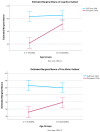Does the Degree of Prematurity Relate to the Bayley-4 Scores Earned by Matched Samples of Infants and Toddlers across the Cognitive, Language, and Motor Domains?
- PMID: 37998712
- PMCID: PMC10671985
- DOI: 10.3390/jintelligence11110213
Does the Degree of Prematurity Relate to the Bayley-4 Scores Earned by Matched Samples of Infants and Toddlers across the Cognitive, Language, and Motor Domains?
Erratum in
-
Correction: Winter et al. (2023). Does the Degree of Prematurity Relate to the Bayley-4 Scores Earned by Matched Samples of Infants and Toddlers across the Cognitive, Language, and Motor Domains? Journal of Intelligence 11: 213.J Intell. 2025 Jul 23;13(8):91. doi: 10.3390/jintelligence13080091. J Intell. 2025. PMID: 40863202 Free PMC article.
Abstract
The literature on children born prematurely has consistently shown that full-term babies outperform preterm babies by about 12 IQ points, even when tested as adolescents, and this advantage for full-term infants extends to the language and motor domains as well. The results of comprehensive meta-analyses suggest that the degree of prematurity greatly influences later test performance, but these inferences are based on data from an array of separate studies with no control of potential confounding variables such as age. This study analyzed Bayley-4 data for 66 extremely premature infants and toddlers (<32 weeks), 70 moderately premature children (32-36 weeks), and 133 full-term children. All groups were carefully matched on key background variables by the test publisher during the standardization of the Bayley-4. This investigation analyzed data on the five subtests: cognitive, expressive communication, receptive communication, fine motor, and gross motor. A multivariate analysis of covariance (MANCOVA) assessed for group mean differences across the three subsamples, while controlling for the children's age. Extremely premature children scored significantly lower than moderately premature children on all subtests, and both preterm groups were significantly outscored by the full-term sample across all domains. In each set of comparisons, the cognitive and motor subtests yielded the largest differences, whereas language development, both expressive and receptive, appeared the least impacted by prematurity. A follow-up MANOVA was conducted to examine full-term versus preterm discrepancies on the five subtests for infants (2-17 months) vs. toddlers (18-42 months). For that analysis, the two preterm groups were combined into a single preterm sample, and a significant interaction between the age level and group (full-term vs. preterm) was found. Premature infants scored lower than premature toddlers on receptive communication, fine motor, and cognitive. Neither expressive communication nor gross motor produced significant discrepancies between age groups The findings of this study enrich the preterm literature on the degree of prematurity; the age-based interactions have implications for which abilities are most likely to improve as infants grow into toddlerhood.
Keywords: Bayley-4; age differences; early childhood assessment; preterm birth.
Conflict of interest statement
The authors declare no conflict of interest.
Figures
References
-
- Adams-Chapman Ira, Bann Carla M., Vaucher Yvonne E., Stoll Barbara J., Network Human Development NICHD Neonatal Research, Health Eunice Kennedy Shriver National Institute of Child. Association Between Feeding Difficulties and Language Delay in Preterm Infants using Bayley Scales of Infant Development. The Journal of Pediatrics. 2013;163:680–5. doi: 10.1016/j.jpeds.2013.03.006. - DOI - PMC - PubMed
-
- Allotey John, Zamora Javier, Cheong-See Fiona, Kalidindi Madhavi, Arroyo-Manzano David, Asztalos Elizabeth, Post Joris A.M. van der, Mol Ben W.J., Moore Derek, Birtles Deidre, et al. Cognitive, Motor, Behavioural and Academic Performances of Children Born Preterm: A Meta-Analysis and Systematic Review Involving 64 061 Children. BJOG: An International Journal of Obstetrics & Gynaecology. 2017;125:16–25. doi: 10.1111/1471-0528.14832. - DOI - PubMed
-
- American Educational Research Association. American Psychological Association. National Council on Measurement in Education . Standards for Educational and Psychological Testing. American Educational Research Association; Washington, DC: 2014.
LinkOut - more resources
Full Text Sources


